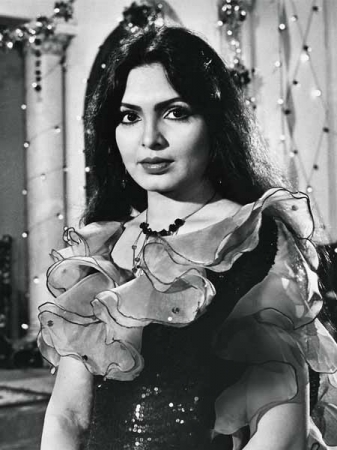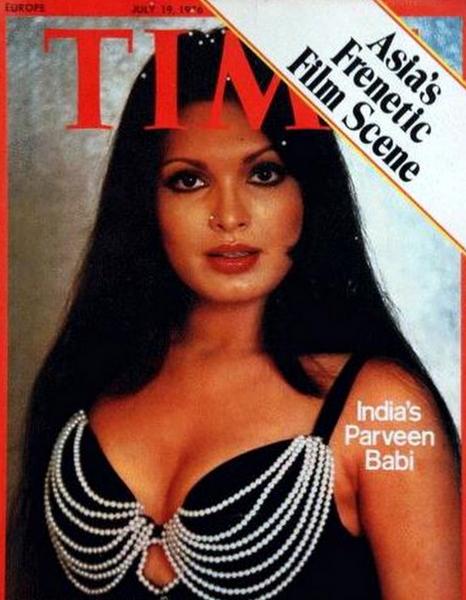A sharply sculpted face with cheekbones bouncing off light. Hair, rippling like silk across the screen. Sensuality that was wide-eyed innocence in one instant and overwhelmingly dark and compelling in another. Crystal clear diction. It is hard to describe Parveen Babi in conventional terms.
She was pure sunshine in Amar Akbar Anthony. A chatty, infinitely entertaining journalist in Kala Patthar. A poised lady in red in Deewar, puffing away some deep sorrow and chatting up a tall, dark stranger in a bar. A demure housewife in Rang Birangi. A guileless college student in girlish frocks, sniffing a premature heart-break into a box of tissues inSuhag. A heedless seductress you still felt sympathy for in Yeh Nazdeekiyan. An imperiously taciturn dancer in Namak Halal. The face of Hindi cinema on the cover of Time magazine in 1976.
The woman who wanted something deeper than success, searched for Godmen and men who could give it to her and threw a glittering career away to vanish into oblivion for years. And the diabetic, overweight woman who died of unspecified complications, in a lonely house with a gangrenous leg, in January 2005.
This month, I was drawn repeatedly to Parveen Babi’s memories, films, songs and trivia and then learnt that April 4 had been her birthday. Then I watched an old interview on YouTubewhere Shekhar Suman chatted her up sometime before her death. And there she was again. Unrecognisable but articulate and well groomed, living in a well-appointed home, sharing her plans to do a talk show, may be get into interior design and then with complete unselfconsciousness, talking about some TADA related documents she wanted to present before the Supreme Court. It was hard to reconcile this Parveen Babi with the girl who dazzled us on screen and magazine covers.
That she had a psychiatric condition is common knowledge but is it possible that perhaps she was also one of those few people who just cannot get past the emotional injuries, blows and betrayals that most of us are resilient enough to forget, forgive and make peace with? Maybe, she was just too sensitive, too responsive to all that could go wrong with life. Maybe, the little girl who lost her father at the age of seven kept searching for someone who could nurture her back into life.
Babi was spotted by filmmaker BR Ishara in a crowd when she was nonchalantly smoking and was to become a counter-point to Zeenat Aman who at that time was the only heroine with a decidedly bohemian appeal. But Babi had acting smarts as well that not too many directors were astute enough to explore barring maybe a Vinod Pandey who gave her Yeh Nazdeekiyan.
This film created an uproar because of a controversial beach scene where she emerges sensuously from the ocean. There was also the matter of falling in lust with a married man who sets up house with her but can’t forget his wife. Babi, though in a less sympathetic role than Shabana Azmi was riveting, not just in scenes where she went hysterical with insecurity but in that final scene where she finally ends it over a cigarette and a matter-of-fact, mature conversation in a restaurant.
In her own life though, things did not ever end as cleanly. She was once seen on the streets of London, post a break-up, kicking a can, looking distraught and lonely. Or so says a biographical TV show on her life that aired a few years ago. At the height of her success, Babi felt emotionally bereft, fell right into heart-breaks, isolated herself from friends, family and colleagues and reached a point where on the show-piece set of Shaan‘s title song, in front of a few 100 extras and the lead actors of the film, she burst into hysterics that a disco ball swirling above her head had been programmed to fall upon her.
She was building up an alternate universe of bizarre fears and obsessions in her head and would hide in her house at times, fearing that she was going to be killed. She followed Osho for some time and then philosopher UG Krishnamurti was her anchor and he would bring her back occasionally to a point where she was able to work normally for some time but then the old fears would erupt again. She was once seen applying layers of make-up on her face because she could not see just how beautiful she was.
At one point, she vanished from Krishnamurti’s house in America and was found by him in a mental health facility. He took her away but Babi was beyond repair by this time. She had not found love. She did not much care for success and she had no support-system to rescue her from the darkness she was spiralling into.
Hers was a life of extremes. Lived in an extreme close-up where her face was the stuff dreams are made of. And then lived away from fame, from intimacy and social interaction for years. To a point where she became an altered version of herself, far removed from reality, unaware of the sweeping statements she made, unable to see just how slowly but surely her isolation was going to kill her.
I read somewhere that the biggest human need in the world is to find a co-witness to our life. For some of us, this witness watching us breathe, live, triumph or struggle is a benevolent parent. For others it is a life long friend or a soul-mate. For a few, this witness is their own sense of self. The whole world was a witness to Parveen Babi’s life on the screen but as she jumped through hoops of fame, ducked them and vanished, hit rock bottom, came up for breath again, there was no one to watch her do it. Or to see her die.
Just goes to show, success is not all that it is made out to be. And that all the frippery, bows and ribbons in the world cannot guarantee a happy ending. Even if the woman in question happens to be as beautiful as Parveen Babi.
Reema Moudgil has been writing for magazines and newspapers on art, cinema, issues, architecture and more since 1994, is an RJ, hosts a daily Ghazal show, runs unboxed writers, is the editor of Chicken Soup for The Indian Woman’s soul, the author of Perfect Eight (http://www.flipkart.com/perfect-eight-9380032870/p/itmdf87fpkhszfkb?pid=9789380032870&_l=A0vO9n9FWsBsMJKAKw47rw–&_r=dyRavyz2qKxOF7Yuc ) and an artist.









As perfect a piece as could be – capturing the almost perfect Parveen Babi, until you probe deeper.
Nicely studied and very written. Would love to read more from you on film personalities!
Honest, heart-wrenching and astute.
Insightful. I stop anywhere and almost every where when I hear about Zeenat and Parveen.
It’s just how sometimes people talk about Janis Joplin or Jim Morrison or one of those Woodstock stories, you have to wait and read to know what is the buzz about.
Well done, thank you.